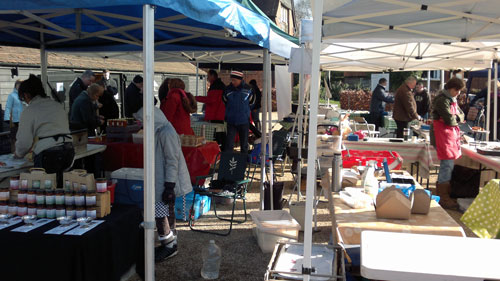Organic produce may be a wonderful thing, but there are some, err, buts! For example, it tends to be quite expensive, not always readily available, can have shorter shelf lives and may be flown in thousands of miles before it reaches you. Sales of organic food in the UK are 10 times higher than they were in the mid-nineties. However, in our current climate of economic and financial hardship, sales of organic produce are unsurprisingly dropping.
Despite mixed scientific evidence regarding positive nutritional consequences, support for organic standards on ethical grounds, in addition to the potential for health benefits, has strong appeal. However, what is or is not "organic" is not always clear. For example, organic wine prohibits the use of artificial chemicals in the grape growing and vinification processes, yet copper sulphate sprays, for instance, can still be used. In contrast, biodynamic wines use homeopathic sprays and herbal preparations.
The word "organic" has a strict legal definition and can only be used by manufacturers and producers who are registered with a recognised organic accreditation organisation. In order to achieve this accreditation, a strict and potentially costly set of guidelines must be followed. Consequently, individuals or companies who do not want this extra expense, but adhere to most or all of the principles of "organic" food and drink, will be unable to market their products as such.
The concept of local food, on the other hand, is far more transparent and despite having no clear definition, "local" in this context tends to be considered as pertaining to a geographical radius of 30-50 miles.
My view is that perhaps we should consider prioritising local over organic food. Apart from reducing air miles and helping local food producers / farmers, there is another perhaps "quieter" food revolution to support. Wherever you are in the UK, it is possible to source good quality nutritious and often inexpensive food and drink. Buying local helps to raise awareness of our culinary heritage and diverse home-grown resources. Clearly disposable income and time will influence whether we are able to shop at farmer’s markets, for example, but positive education into reversing our nation’s poor gastronomic stereotypes can only benefit us. Buying local is one way of achieving this.
However, what do you think ?



Think you have a point about local: when I ordered fish from Abel and Cole, it was coming from Devon and Cornwall…perhaps, as we are in London there is no such thing as ‘local’ fish but the veg is a different matter. There must be good farms in Hertfordshire.
Organic rules are peculiar…if you want to be nice to chickens , it has to be free range as well because organic in itself is no guarantee of roaming around, access to chicken basketball etc
I object to buying blackberries shipped in from Europe when I used to be able to pick them from the back of the garden…insane.
Good points there.
I don’t object to buying fruit and veg from overseas when out of season in this country… but as you say, there’s no need to buy Mexican blackberries and Dutch pears when English ones are IN season …
I know price is a determining factor in most of our shopping decisions, but I would hope that greater support of local farming might help keep prices affordable.
I would certainly only buy organic chickens from the UK as it also helps UK business as well as ensuring better welfare for the birds. As well as reduced travel miles.
I would also add the taste of these chickens is also far nicer than the supermarket watery chicken legs that can be purchased for a quarter of the price.
An extra benifit is that one organic chicken leg provides meat which is very dense and filling, so two supermarket chicken legs do not have to be served per helping.
Better to eat organic chicken once per month than every week from a bird that has not had a healthy life and probably contains more Anti B’s than a chemist!
Good points JT – a combination of local and organic may be best, although local meat raised more or less “organically” may still not qualify for the organic label. However, price still remains the determining factor for many consumers.
Robin
Great blog Robin, I agree we should push to buy local food as much as possible however I still would go organic over a non organic locally raised produce anyday.
Totally agree with paying the local farmer over giant corporations that quite frankly dont care about the local farmer or the health of the produce or the consumer.
Thanks for your support, Tom. Personally, I think that for example, while in season, we need to buy English asparagus, rather than organically produced asparagus from other countries 1000s of miles away.